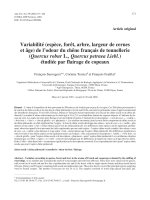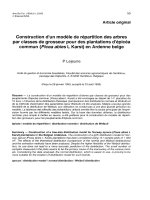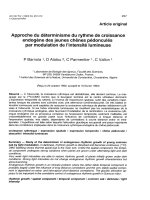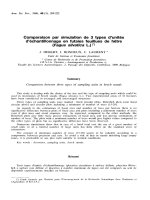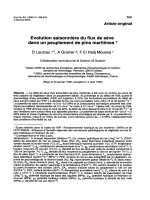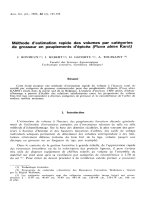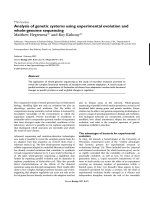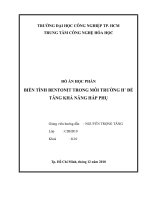EXPERIMENTAL EVOLUTION (LECTURES), PAR H. DE VARIGNY 1892
Bạn đang xem bản rút gọn của tài liệu. Xem và tải ngay bản đầy đủ của tài liệu tại đây (9.41 MB, 278 trang )
NATURE
SERIES
EX P E R I M E N TA L
EVOLUTION
LECTURES
DELIVERED
" SU MMER
UNIVERSITY
SCHOOL
HALL,
HENRY
IN
OF ART
THE
AND
SCIENCE"
EDINBURGH
DE VARIGNY,
{A-^^S&.&§if v
D.Sc.
DKMONSTKATOK IN THE l'ARIS MUSEUM D'HISTOIRE NATURELLE, MEMDER OF THE
SOCIETE DE BIOLOGIE
îLonùon
MAC M ILL AN
A N D
N E W
AND
CO.
Y O R K
1892
The Right of Translation
and Reproduction
is
Reserved
RICHARD CLAY AND SONS, LIMITED,
LONDON AND BUNGAY
PREFACE
T H E following pages contain a record of lectures which
I delivered in August, 1891, in Edinburgh, before the
very cultivated and attentive audiences afforded by the
Summer School of Art
and Science which Professor
Patrick Geddes is evolving with great
energy and
dévotion
to
science,
expense of
aided
by
some
personal friends whose interest he has well awakened
in the organisation and diffusion of knowledge.
I
wish to be reckoned among thèse ; and I took part
with much
pleasure
a visit
Edinburgh,
to
in the proceedings, while
Oxford,
Cambridge,
on
and
London, where the French Government had commissioned me to investigate the University Extension
Movement.
Thèse
of
the
lectures do not cover the whole
subject :
I
have
purposely
ground
given
most
attention to documents and facts of French origin,
as
they are certainly less familiar to an
English
audience, although the similar facts and documents
of
English
origin are, if anything, more
familiar
vi
P R E F A C E
to myself, and also much more extensive in some
lines.
My désire has been more specially to show what
should be done, in future, on behalf of the Evolution
Theory, so that I may be excused if I have not gone
entirely through the facts of the past ; and as I consider
that experiment is now the only method of securing any further advance in solving the problems of
organic évolution, I have wished to state the matter
clearly, and to give some circulation to the statement
in the country where this line of study has most
followers.
A n d now I should ask of my readers to excuse such
literary or grammatical defects as they may meet with
in this volume.
A foreigner can scarcely be expected
to master ail the niceties of the English language.
However, my friends Prof. Patrick Geddes and J. A .
Thomson having been kind enough to look over the
proofs—and this I most sincerely thank them f o r —
I feel the most important inelegancies or errors have
been excluded, although English readers must doubtless perceive that the author is not writing in his
native language.
H.
MONTMORENCY
(SEINE ET OISE),
October 10/A, 1891.
FRANCE,
DE
V.
CONTENTS
LECTURE I
PAGE
The problem of the
concerning
Living
it—General
World—The
Statement
of
three Hypothèses
the
Evolulion-
hypothesis—Graduai Growth of this Hypothesis, considered
especially
de Maillet
in French Literature :
(1749) ; Robinet
Claude Duret (1605) ;
(1766) ; Buffon
(1761-6) ;
Lamarck (1809) ; Geoffroy St. Hilaire, etc.—Naudin {Revue
Horticole, 1852) anticipâtes the Natural Sélection Theory—
General Proofs of Evolution : Palaeontological,
Embryo-
logical, Morphological—Thèse Proofs not absolutely conclusive—Direct Proof is wanted, and wanting—Nothing will
suffice but the Transformation of one Species into another :
Expérimental Evolution necessary
L E C T U R E II
Expérimental Evolution based on Three Groups of Facts—First
Group : the Facts of Natural or Spontaneous Variation :
Organisais are not rigid structures, but exhibit much plasticity.
-—Facts of Variation in Çolour, correlated sometimes, and
I
viii
CONTENTS
perhaps
always, with variation
of
chemical
composition
(Armand Gautier's investigations) ; Variation in Dimensions
and Experiments on the real cause of this Variation, Semper
and the Àuthor ; Variation in Integuments, Form, Shape of
Fruits and Leaves, Flowers—Penzig's Pflanzen- Tératologie—
Skeleton, Muscles, Internai Organs andViscera; Sexuality—
Neotenia
46
L E C T U R E III
The Facts of Natural or Spontaneous Variation
[concluded)—Phy-
siological or Chemical Variation—Often exists where unsuspected—May be noticed in ail parts of the Body, even
between very closely-related Forms—Exists not only between
différent Species, but between Varieties of same Species,
Individuals of same Variety, and even différent âges of same
Individual—Chemical Variation explains Racial Immunity to
peculiar Diseases—This Chemical or Physiological Variation
in some cases of much higher import than any Morphological
Variation—Chauveau's Experiments on Bacillus
anthracis—
Physiological Différences between Brown and Green Frog
towards Poisons
and Heat—Tarchanoff's
Experiments—
Variation generally exists at ail Ages, in ail Groups of
Beings, at ail Geological Epochs—Sudden Variation . . .
LECTURE
IV
Second Group of Facts supporting Expérimental Evolution ; Facts
of Domestication of Animais ; their Departure from the
original Wild Type as seen in the cases where the latter still
exists ; Much more might be done in this way, and many
114
CONTENTS
IX
PAGE
new Resources discovered ; Domestication has caused Animais
to vary in ail parts of their Organism, from Weight of Brain
to Length of Digestive Tract.
Third
Group of Facts :
Cultivation of Plants ; its Influence ; the Departure from
the original Wild Type ; Variation in ail parts of the Plants
from Roots to Flowers ; Numerous Varieties of the commbnlycultivated Vegetables.
Fourih Group of Facts : Influence of
Environment on Structure ; Closeness of Agreement between .
Environment and Organism ; Beudant and Raulin's Experiments ; the Author's Experiments ; Dareste and Teratogeny ;
Pouchet, Yung ; Facts and Experiments ; Pierre Lesage ;
Schmankevitsch ; Weismann's Criticisms
156
LECTURE V
Expérimental Evolution based on the four preceding Groups of
Facts.
Thèse Facts illustrate at the same time its Methods,
which are : Change of Environment ; Use and Disuse ;
Natural Sélection ; Sexual
Sélection.
Sélection ; and
Physiological
Thèse Factors of Evolution must ail be subjected
to Expérimental Test in order to show what they can Effect.
What is wanted : A Direct Proof, which ail may Perceive and
Touch, of one Species (or Form) giving Birth to another
more or less Différent, and Permanent.
Numerous Accessory
Problents to be Investigated at the same time.
Scientific
and Practical Import of this line of Investigation.
Require-
ments : Farm and Laboratory ; Animais and Plants ; Time ;
Experiments must be able to last 20, 50, 100 Years or more.
This Expérimental Investigation must and shall be perfbrmed.
But who is to begin ?
INDEX
,
226
261
EXPERIMENTAL
EVOLUTION
EXPERIMENTAL
LECTURE
EVOLUTION
I
Summary—The Problem of the Living World—The three Hypothèses
concerning it—General Statement of the Evolution-hypothesis—
Graduai Growth of this Hypothesis, considered especially in French
Literature : Claude Duret (1605); de Maillet (1749); Robinet
(1766); Buffon ( 1 7 6 1 - 6 ) ; Lamarck (1809); Geoffroy St. Hilaire,
etc.—Naudin {Revue Horticole, 1852) anticipâtes the Natural
Sélection Theory—General Proofs of Evolution : Palaeontological,
Embryological, Morphological—Thèse Proofs not absolutely conclusive—Direct Proof is wanted, and wanting—Nothing will suffice
but the Transformation of one Species into another : Expérimental
Evolution necessary.
DuRING countless âges, of which centuries are mere
moments, and whose number and length we can yet
by no known
method prétend to appreciate, our
planet—an atom amidst an infinité world of similar
bodies—has been teeming with life.
Innumerable
millions of plants and animais have lived and died,
on the earth, in the waters, in the air ; and if we can
B
hardly estimate the number of the forms of life, it is
impossible to obtain any idea of the enormous—
although
finite—number
of the individuals.
How
many plants were required to form a square foot
of coal ; and of how many Protozoa and sponges
is a cubic inch of chalk the only vestige ?
could
dare to form an estimate
of
the
Who
number
of organisais which have disappeared and died without leaving a single vestige, whose bodies, through
the slowly clisintegrating processes of décomposition,
aerial or submarine, have abandoned their éléments
to
the atmosphère, the water, and the
soiï,-—the
materials of life whence they have unceasingly returned to new organisais in the course of that circulus
which, like life itself, knows neither rest nor immobility ?
T h e very éléments which at the présent
moment are parts of ourselves, of our bones, of our
flesh, of our blood, brain, or nerve, were part, not
very long ago, of our ancestors—further back still,
of prehistoric man ; and in a remote past, of that
inconceivable number of organisais of part of which
the sedimentary strata are the enormous burial-ground.
A n d when we come to consider that the circulation
of matter is unce&sing and continuous between the
earth, the air, and the water on the one hand, and
ail living
organisms,
animais, or plants,
on
the
othcr, we cannot help coming to the conclusion that
I
THE
PROBLEM
OF THE
LIVING WORLD
3
ail présent life is made up from the éléments of
past life—that we are verily the flesh and blood of
the dead, récent or remote, and that the air we inhale, the water we drink, the food we eat, are for
the greater part made with éléments derived from
thèse dead.
This notion is a very simple one, and certainly
familiar to
remote.
ail.
Not
A n d yet, its origin
to speak of
is not
our ugly brute of
very
an
ancestor, that prehistoric man, who struggled hard
for dear life—and this we must thank him for—under
hard times and against many foes, without tools
without weapons, " sans everything " in fact, and who,
we may imagine, had but little spare time left for
philosophical méditations after he had provided the
food necessary to his companion and progeny,
and
scttled his little accounts with troublesome neighbours, bipedal or quadrupedal, did this notion ever
cross the brain of the Gauls, Celts, or Britons of old ?
Did it even suggest itself to that old father of science,
to Aristotle, or to his commentators of mediaeval
times ?
Surely not, and in fact, no exact idea of
the circulation of matter could be obtaincd even a
century ago, when chemistry was yet only entering
upon life, and acquiring the dignity of a science.
The samc is true of
the
greater
part of
modem ideas and science.
Y,
2
our
T h e philosopher of Geneva has said
condition
of him who
condition, and that the
is
a
depraved
entertained
reflects is an
that " the
1
anti-natural
man given to
animal."
Some
méditation
doubts
concerning- the second
term
may
be
of
this
sentence, although the unhealthiness of méditation
is often obvious ; but it is certainly true that under
natural conditions, very little time is available for
méditative purposes.
Even in our so-called civilized
life, how very small
is the number of those
who
do often really think and ponder on topics which
are neither food, nor dress, nor money.
Most men
live, in fact, without troubling themselves with any
of the really great questions which force themselves
on the attention of the
few who think, and they
leave those vexed questions of force, matter, movement, space, life, consciousness, death, will, memory,
morality, right
logist, and
and wrong, to the physicist, bio-
moralist,
with some
disdain, pitying
them most thoroughly for devoting their time, life,
and energy to problems which apparently do not
admit of being solved.
T h e thinkers are however not of the same mind as
the multitude ; they entertain the
opinion—absurd
in the eyes of m a n y — t h a t human science has yet a
1
J. J. Rousseau, Discours
sur l'Origine
l'Inégalité parmi les Hommes, 1754.
et
les Fondements
de
I
THE
PRORLEM
OF T H E
LIVING WORLD
5
long l'oad to travel, that unexplored fields are yet
innumerable, and that no problem can be considered
insoluble so long as it has not been subjected to a
thorough
investigation
methods.
If we consider that the number of thèse
by means of ail available
methods increases each day, if we remember
that
discoveries which seem quite insignificant are often
pregnant with the most important déductions—from
Galvani to
the telegraph
and the téléphone one
small century only has elapsed—we may fairly conclude that a problem which hardly admits to-day of
any investigation may suddenly be solved to-morrow.
I may be allowed to quote an instance among many.
Some forty years ago a young man spent a long time
in the seemingly very spéculative and idle study of
dissymmetry and symmetry in various crystals.
The
practical value of such investigation seemed to be
nought, and at ail events it had no interest save for
the elucidation of some points in
But
this investigation
fermentation,
earliest
and the
work
has
ping stones—the
a large
number
them, and the
final
outcome of
been—leaving
discovery
of
crystallography.
led logically to a study of
of the
out
real
Pasteur's
the
step-
cause
of
diseases, the cure of one of
expectation,
based
on facts,
that
ail of thèse diseases can be defeated by appropriate
methods.
Little causes have great effects, and no
ascertained fact is useless ; this must be kept in
mind.
T o return to our question, w e may conclude that
no problem is out of man's reach : there is none he
may not grapple with, more or less successfully.
But this notion, also, is a very modem one, and
while the many at présent certainly disagree with it,
w e d o not require to go centuries back to find the
thinkers themselves of
a différent
opinion on the
matter, and sharing the creecl of the mass.
This explains how it
is that man has so long
delayed to investigate the problem o f the
day, which is the problem of the world.
sidered the
présent
He con-
problem as admitting of no possible
investigation, and
accepting the Scriptures
as
a
scientific text-book as well as a book of morals, he
even perceived no problem at ail, and lived in quietness and repose.
But some were at work, observ-
ing, comparing, and noting facts.
Their names are
familiar to ail, and the outcome of their diverse work
and tendencies broke upon the world in 1859.
For
Darwin, while seemingly inquiring only about
the
origin of cats and dogs, and pigeons, and their probable relationship with antécédent similar animais,
had opened new prospects.
understood ; and
behind
This was immediately
the
cats, dogs, pigeons,
swine, and cattle, ail beheld a new System of the
I
THREE
HYPOTHESES
world, quite différent from that
7
of the
currently
accepted creed.
T h e gênerai System we shall leave out in the course
of thèse lectures ; that which concerns us here
is
its application to the organic kingdom.
How did animais and plants corne to life, and how
are we to explain the présent state of nature ?
A s Professor H u x l e y clearly states in his American
Addresses, there are only three hypothèses concerning
this matter.
T h e one is that the présent state of things has
always existed, and, I présume, never began.
is one of the propositions which
terms unthinkable.
This
Herbert Spencer
There must have been a begin-
ning, because we know there is an end of ail things ;
but in fact, it would be perfectly Quixotic to argue
against this windmill, as no one works it.
I am not
aware that any scientists maintain this position.
The second hypothesis is that the présent world
of animais and plants began suddenly in some past
epoch, in tîie course of the days or periods of création : this is the theory of the book
of Milton's Paradise
Lost,
the orthodox
of Genesis,
theory of
the greater part of the civilized millions.
This hypothesis
is a more rational one, and no
objection coulcl be raised against it, in my opinion, if
the facts we are acquainted with were not in direct
contradiction with it.
A s to the
feasibility of
a
création after this mode, we can entertain no doubt.
Mïraculous and incompréhensible is this theory : but
ail théories which prétend to explain the beginnings
are so ; they cannot avoid recurring to the hypothesis,
either of the spontaneous génération of matter, energy,
and life—of the whole intricate and complex system
of
things, or of the création of ail this by some
mighty being, the watchmaker of Paley's well-known
argument.
But
is naturally asked.
who
made
the
watchmaker ? it
T o the last question neithcr you
nor I are prepared to answer, and as none can answer
it, many come to the conclusion that the question is
absurd and must be dismissed as untenable.
We
must confess that this question is above our reason.
But what of the first alternative ? Can any one of us
show matter, life, or energy spontaneously generated
out of nothing ? No ! and ail the progress of physics
and chemistry goes to show how numerous are the
transformations of energy and matter, and to confirm
steadily the axiom ex niliilo nihil.
If we are asked
to believe in spontaneous création of life, matter, or
energy, we merely answer that this belief goes against
our reason, because we are asked to believe in things
which
are
contrary to ail our
expérience.
1
And
This does not prevent Basile Conta, in his interesting Origine des
Espèces (Paris, Alcan, 1888), from supposing that spontaneous genera1
I
SPECIAL
CREATION
THEORY
9
between two creeds, the one above, the other against
our reason, we prefer the first, willingly admitting that
our présent intelligence is not able to understand most
of the phenomena we are acquainted with—though we
sincerely expect it to become so in the course of
âges—and that any adéquate idea of the origin of
the world is a thing much above the grasping powers
of our intellect.
Suppose some savages discovering one
morning on a sea-beach a watch stranded from some
shipwreck.
No doubt, they ail will corne and cluster
eagerly around it, and if the unfortunate machine be
water-proof, they will listen to the ticking with great
wonder, and will furthermore believe that this watch is
some new and curious sort of animal which takes
more pleasure in ticking than in anything else.
If
those savages are not mere brutes I présume some old
wise man will express his astonishment, and immediately advise his slaves and followers to go and
give fruit and hogs to the priests, because this is an
extraordinary event which has some extraordinary
origin. A n d if you were to tell him that this watch had
been macle by the rushing together of fragments of
stone and sand, he would not believe it.
A t least, I
tion has taken place, and is even taking place daily. He supposes that
the inferior organisms are of very récent, contemporary origin, while
the superior are derived from similar inferior organisms which have
sprung into life in periods which are remote in proportion to the
degree of perfection reached by the higher species.
hope not. W e are such savages.
T h e more we study
nature in its broadest sensé, the more its wheels seem
intricate, and its movements complex.
Of course we
do not understand how it was made so, we do not
understand the watchmaker, nor even his design and
purpose in making the watch, but we perceive the
watch, we understand part of its movements, and so
are compelled
to
believe in the existence of the
watchmaker, although we can form no definite idea
concerning him.
But the fact of believing in the watchmaker's existence, which is forced upon us by the fact that wc
never have seen a single watch corne spontaneously
into existence, and that our expérience shows that no
single élément—wheel, axis, or spring—has ever spontaneously appeared, does not necessarily compel us
to accept
hypothèses
the second, above-named, of the
which
Prof. H u x l e y
recognizes.
may very well accept the watchmaker's
three
We
existence
without being obliged to believe that he made the
watch in
the particular method
described in the
Scriptures, and assumed by the adhérents of the
Spécial Création Theory.
A n d we cannot—so long
as nekher energy nor matter can be shown to arise
spontaneously out of nothingness—we cannot, upon
any theory, dispense with the existence of a Creator.
The third hypothesis is the hypothesis of Evolution.
I
I
EVOLUTION
THEORY
n
cannot do better than quote Prof. Huxley's ovvn
words.
It " supposes that at any comparatively late
period of past tirne, our imaginary spectator [supposed
to be a witness of the history of the earth] would
meet with a state of things very similar to that which
now obtains, but that the likeness of the past to the
présent would gradually become less and less, in proportion to the remoteness of his period of observation
from the présent day ; that the existing distribution
of mountains and plains, of rivers and seas, would
show itself to be the product of a slow process of
natural change operating upon more and more widely
différent antécédent conditions of the minerai Framework of the earth ; until at length, in place of that
framework he would behold only a vast nebulous
mass, representing the constituents of the sun and of
the planetary boclies.
Preceding the forms of life
which now exist, our observer would see animais and
plants, not identical with them, but like them ; increasing their différence with their antiquity, and at
the same time, becoming simpler and simpler, until
finally
the world of life would présent nothing but
that undifferentiated protoplasmic matter which, so
far as our présent knowledge goes, is the common
foundation of ail vital activity."
1
T o put it briefly : the evolutionary hypothesis sup1
American Addrcsses.
Three Lectures on Evolution,
p. 10.
poses that from matter and force, the entire world and
the life it contains—their past, présent, and future—
have been, are, and will be evolved by a natural
process,
without
any
spécial
interférence
Creator, whose existence seems to me
of
the
necessarily
assumée!.
T o quote again Professor Huxley :
thesis of
1
" The hypo-
évolution supposes that in ail this vast
progression there would be no breach of continuity—
no point at which we could say, ' This is a natural
process,' and ' This is not a natural process,' but that
the whole might be compared
to
that
wonderful
process of clevelopment which may be seen going on
every day under our eyes, in virtue of which there
arises, out of the semi-fluid, comparatively homogeneous substance which we call an egg, the complicated organization of one of the higher animais."
Excluding
the
nothing, and
first
merely
hypothesis, which
ignores
the
explains
problem
to be
solved, the whole discussion is between the second
and third.
A n d we cannot wonder at the rivalry
disp'layed on both sides—we cannot wonder at the
passionate
fighting
which
lias been carried on
at
each discussion of the matter, when we consider that
in fact the question is not merely zoological, but
metaphysieal
1
and
American Addresses.
spéculative,
and
that
Three Lectures on Evolution,
the
real
pp. 10, i l .
matter under discussion is not the origin of species,
but the origin of the world and of ail it contains, man
himself included.
It would require much time to convey a correct
idea of the graduai évolution of the Evolution theory
itself.
It did not spring out of the brain of one man,
fully equipped and ready, as Minerva is said to have
corne to life.
On the contrary, it developed slowly,
cautiously, very timidly, we may say.
A n d this for
good reasons, prominent among which was the unanimous assault its defenders had to receive each time
they tried to say a word in its favour.
No doubt thèse
fights and defeats were unpleasant, but they turned
to the advantage of the vanquished, and each defeat
became a tonic to him, by which his forces were
invigorated and freshened.
T h e idea of évolution,
and more specially of organic évolution, is, however,
of récent origin.
unscientific notion.
A t first it was a very vague and
Although I have no intention of
giving an historical account of the évolution of the
Evolution theory, I may be allowed to give some
instances, to show some
instances
are certainly
stepping-stones.
to
be
found
in
Similar
English
and German literature, but I shall be content with
quoting here some facts belonging to French literature, as they may be less familiar to most English
readers.
In
1609 Mons. Claude
Duret, Président of
the
Bench in the town of Moulins, in central France,
published a quaint book
trations.
This Histoire
with
still quainter illus-
admirable des Plantes
. . }
contains evolutionaiy notions of a very queer sort.
He fully believes that many aquatic birds, as well as
many sorts of insects, are generated from the rotten
wood of trces.
In Scotland it seems—perhaps somc
of you have heard of the fact and arc ready to vouch
for it—in
Scotland there is onc sort of tree more
peculiar than others ; the leaves which fall on the
ground yield birds, while those which fall into water
are soon changed into fishes. There is no doubting
the fact, as the
in an old
scène is very distinctly
wood-engraving.
A
depicted
photograph,
how-
ever, would bc more convincing, but then Daguerrc
and Niepce had not made their appearancc at that
time.
It may be rcmarked that some seventy years later
Father Kircher, in his Mundus
Subterraneus?
still
believed in many strange notions of the same sort, and
depicted the genesis of birds, apes, and men by means
of the transformation of some orchids.
He had been
The full title is : Histoire admirable des Fiantes et Herbes esmerveiUabîes et miraculeuses en Nature, mesmes d'aucunes qui sont vrays
Zoophytes ou Plantes Animales . . . . avec leur Portraits au naturel.
i8 . Pnris, Nicolas Brion, 1609.
1
n
2
Amsterdam, 2 vols, in folio, 1678.
DE
I
MAILLET
struck with the resemblance of thèse strange fiowers
to many animais, and therefore concluded that the
latter were derived from the former.
In the meantime De Maillet, French consul in
Leghorn and in E g y p t during a number of years,
wrote, at the end of his life, a strange book called
Tellianied
x
(his own name reversed).
The greater
part of it has little to do with the matter under discussion, but in the last ninety pages, after having
considered the real nature of fossils—a question at
that time much discussed, and concerning which the
truth became established only after numerous difficulties—De Maillet concerns himself with the origin
of man and animais.
His main idea is that ail
terrestrial and aerial animais have their origin in some
corresponding marine form.
For instance, birds arc
derived from flying fishes, lions from sea-lions, & c ,
and man from the " homme mariii" the husband of the
mermaid.
The reason he gives for thèse dérivations
is curious enough.
Considering the many islands—
there were more of them in his time than at the
présent day—which, although uninhabited by man,
contain animais and plants, he argues that if thèse
animais and
plants
are not derived from
marin
Telliamed ; ou, Entretiens d'un Philosophe Indien avec un Missionairc Français, etc., mis en ordre sur les Mémoires de feu M. de Maillet.
Basic, 1749.
1
forms, " we must assume a new création, which is
absurd " (p. 313).
Some years after De Maillet, another French writer
gave utterance to more valuablc notions concerning
évolution. This authorwas J. B. Robinet. There is but
little to interest us in his book, Delà Nature, published
in 1766 (four 8vo volumes, Amsterdam,) but his Vues
philosophiques de la gradation
naturelle des Formes de
[Etre, ou les Essais de la Nature qui apprend à faire
l'Homme (1768, Amsterdam,) contain curious passages.
For instance, he clearly recognized the fact that ail
animais are in many points similar, and that if the
similarity between any two animais at the opposed
ends of the organic scale is difficult to perceive when
they are considered apart from the others, numerous
transitional forms occur, and are real Connecting links
when the whole scale is taken into considération.
Robinet supposes that Nature has an aim, a constant tendency towards perfection, and towards perfection of a given type.
Since the beginning the aim of
Nature has been to prépare man, and the proofs
thereof are not wanting, according to Robinet.
Thèse
proofs are the numerous stones or fossils which bear a
more or less vague resemblance to the organs and
various parts of man, monstrous turnips and extraordinary cabbages, in the form of a hand, a nose, or
an ear, or other parts of the body, whether internai or
I
ROBINET AND
external.
BUFFON
17
Robinet is not very clear about the method
which Nature followed in order to attain her object,
but the last part of his story is quite fiuent, and the
ape appears as the last effort of Nature before she
succeeded in making man.
This is very crude and elementary evolutionism, to
be sure, and the names of Robinet, De Maillet, and
D u r e t have but slight historical interest, but it must
1
be remembered that between Robinet and Darwin not
a century elapsed, and there lies the reason for which
I have wished to recall briefly the quaint notions of
thèse transformists of the past.
A
word, however,
may be said in their defence ; we must remember
that at the time they wrote, little was known concerning species, and no idea could be obtained concerning
their origin and dérivation, so long as their nature was
ignored.
Evolutionism, scientific and really deserving this
name, appeared only a few years after the publication
of Robinet's ungainly views, and here the French
scientists took a prominent part.
Buffon
cornes first.
Much has
been said
and
written- concerning the orthodoxy of the great naturalist, and contradictory statements have been made, so
For détails concerning their théories cf. Henry de Varigny : La
Philosophie Biologique aux xvii* et xidii Siècles, Revue Scientifique,
August 291I1, 18S9. Also De Quatrefages, Charles Darwin et ses Précurseurs français, 1870, of which anew édition is in the press (1S92).
1
c
C
